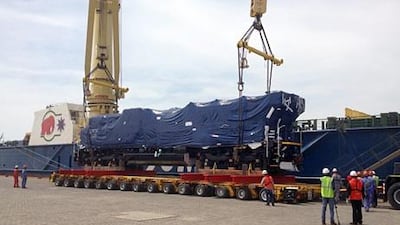Etihad Rail is evaluating bids to connect key cities and industrial hubs in the country and link them to the Saudi border as part of the most important phase of the UAE's multibillion dollar railroads programme.
With the first phase of the programme under way, the government-owned Etihad Rail has turned its attention to the key 628 kilometres of rail lines that will connect Abu Dhabi, Dubai and Al Ain, and run to Ghweifat on the border.
Phase 2 is divided into several packages for the various stretches of rail, as well as the supporting infrastructure.
"The tenders for the second phase have been submitted," said Richard Barrett, the chief executive for the Middle East at Atkins, the engineering firm responsible for the concept design for the project.
It is expected that the contracts will be awarded before the year is out, with the line becoming operational by 2017.
The UAE's rail programme is part of plans to link the GCC with a region-wide network. Etihad Rail's third phase will run to the Omani border, as well as connecting the thriving oil and gas logistics hub of Fujairah with the rest of the country.
Once all three stages have been completed by 2018 in a construction process estimated to cost Dh40bn, the UAE will be covered by about 1,200km of track.
The network is expected to boost the economy by facilitating the movement of goods and labour. The country's industrial hubs of Jebel Ali, Mussafah, the Khalifa Port and Industrial Zone in Taweelah and Fujairah's port outside the Strait of Hormuz will all be connected by Etihad Rail, a joint venture between Abu Dhabi and the federal Government. Through its connection to the rest of the GCC, the UAE will be able to build up its position as a regional trade and logistics hub.
The first phase of the project connects the Shah oil and gasfield with the port of Ruwais. The railway will transport sulphur from the Shah sour gas project that will begin operating next year.
Etihad Rail expects the 264km of rail to be operational before the year is out. The second phase will extend the section that is running along the coast on both sides, linking the main cities to the border with Saudi Arabia.
"With the recent arrival of our wagons, the considerable headway being made in construction on stage one, and as we look forward to the arrival of our locomotives later this quarter, Etihad Rail is on schedule to see the first train run from Habshan to Ruwais by the end of this year," Nasser Saif Al Mansoori, the chief executive of Etihad Rail, said in February.
The same month, the company secured a Dh4.7bn loan for the first phase.
So far, Saudi Arabia is the only GCC country with a rail network. More than 1,300km of track connects Riyadh with the kingdom's main oil-producing region on the Gulf coast and provides transportation for industry and the military.
Saudi Arabia's rail master plan envisages the construction of a further 5,500km of track by 2025.
The Saudi plan includes a line to connect the UAE with Qatar and Kuwait, as well as a line that would link up the Gulf and the Red Sea.

